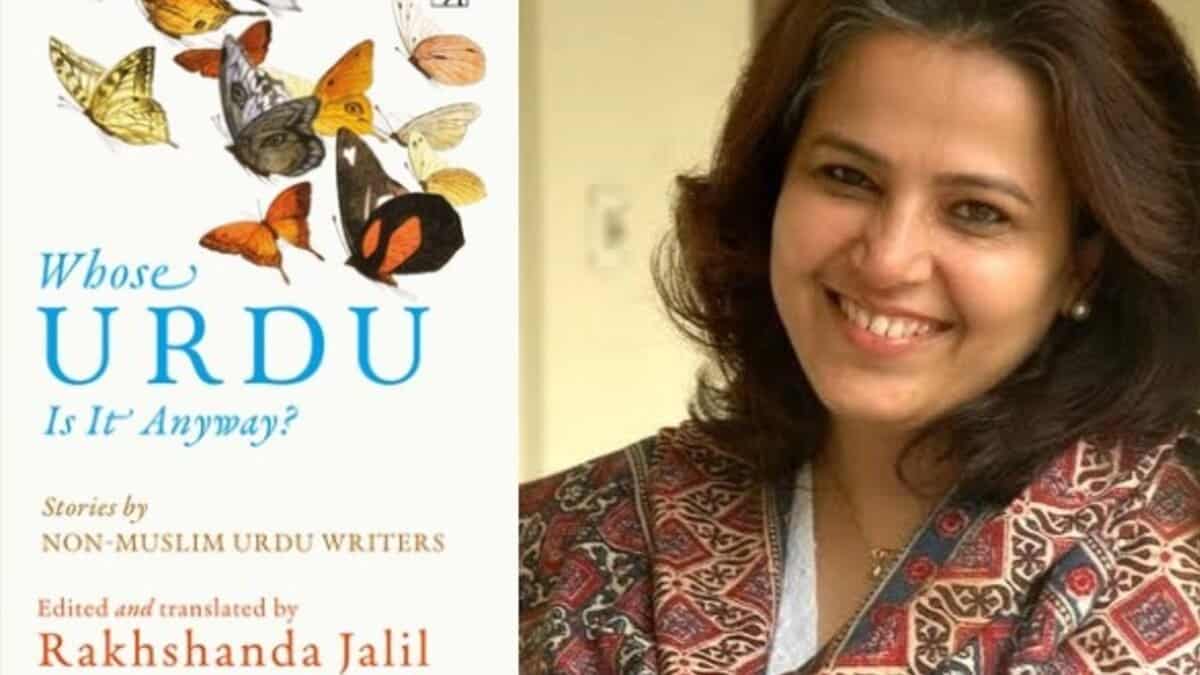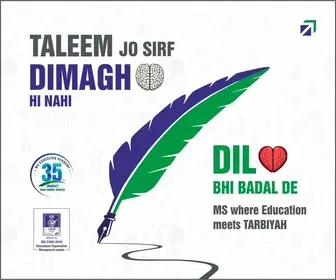
Partition brought in its wake quite a few myths. One that religion can be the basis of Nationhood, crystallized by Hindu Mahasabha and Muslim League in the form of Two-Nation Theory. Two about appeasement of Muslims. Three that Partition hurt only the Hindus. Last, but not the least that Urdu is the Language of the Muslims and that, too, because Pakistan declared it as its Official Language. It resulted in a tie in the Constituent Assembly, when the National Official Language was being debated. It resulted in voting and there was a tie, with those for and against Hindustani getting 78 votes, each. As President of the Constituent Assembly, Dr Rajendra Prasad gave his Casting Vote for Hindi, which was not to the choice of Father of the Nation Mahatma Gandhi. Gandhiji, along with Pandit Jawaharlal Nehru, favoured Hindustani. Rest is history, how Dharam Vir Bharti led the campaign for Sanskitization of Hindi, making the language lose its own flavour.
Rakhshanda Jalil, renowned author, critic, translator and literary historian, serves to explode one of the myths successfully that Urdu is the language of the Muslims.
Whose Urdu Is It Anyway?
Rakhshanda’s latest book, Whose Urdu Is It Anyway? Stories by Non-Muslim Urdu Writers, contains stories of 16 Non-Muslim writers in Urdu. It includes the likes of Krishan Chander, Rajinder Singh Bedi, Ramanand Sagar and Kanhaiya Lal Kapoor, among others. Stories of these 16 writers has been translated from Urdu into English and edited by Rakhshanda Jalil.
In her own words, this book takes one beyond the Myth that Urdu is the language of Muslims. This book, says Rakhshanda Jalil, is an attempt to bust stereotypes and address a persistent misconception: that Urdu is the language of India’s Muslims and that it addresses subjects that are, or should be, of concern to Muslims and Muslims alone. Aim, she says, is to locate Urdu in its rightful place — in the heart of Hindustan.
Slowly, but surely, these myths had to vanish into the thin air. For instance, Liberation of Bangladesh is a shining testimony to the fact that religion cannot be the basis of Nationhood. Mahatma Gandhi lived and died for Hindu-Muslim Unity. An orchestrated vicious campaign of appeasement of Muslims cost the nation the precious life of the Mahatma. Partition, in fact, hurt Muslims the most. While many feared for their safety and fled, those, braving the climate of Hate and stayed back in their own country, are, to this day, victimized the most.
Rakhshanda Jalil is so very right about Urdu. In fact, Urdu took birth and has its roots across India. Born in India, it is more Indian. It was the language of the common people. Born in military camps, it was the language of the common man. And a wholly Indian language, born in the Indian soil. Khari Boli, Awadhi and Braj Bhasha absorbed Persian, Arabic and Turkish words. Grammar is the same as that of Hindi. Sanskrit is said to have come from Central Asia with the Aryans.
Literary history of urdu
Urdu has a literary history and tradition of at least 400 years, from the time of the first Diwan in Urdu poetry, Quliyaat-e-Mohammad Quli Qutub Shah. Popular Hindi Literature is about 140 years old, or at the most 175 years old. Hindi is more a Link Language between Khari Boli, Awadhi and Braj Bhasha.
On the other hand, Urdu has greater claim to be the Link Language of India. Unlike Hindi, limited only to the Hindi-heartland, Urdu has geographic spread, from Punjab, Lucknow and Bhopal to former Hyderabad State in the South.
Pakistan has no place where Urdu is spoken. It has Pakhtun, Punjabi and Sindhi. Bangladesh broke away, reasserting the Bengali Pride. Where is Urdu in Pakistan?
Freedom Struggle language
Urdu is either eulogized as the language of poetry, or simply dismissed as dealing with Muslim subjects. What is missed out is that Urdu is the language of the Freedom Struggle, of Bhagat Singh Singh and Ramprasad Bismil and of Netaji Subhash Chandra Bose and Pandit Jawaharlal Nehru. Maulana Hazrat Mohani gave the inspiring slogan that set the freedom struggle on fire: Inquilaab Zindabad or Long Live the Revolution.
Netaji named his Army as Azad Hind Fouj and gave the stirring call, Tum mujhe khoon do, main tumhe Azaadi doonga (Give me blood, I will give you freedom). Pandit Jawaharlal Nehru gave a speech in Urdu, while moving the Aims and Objectives Resolution in the Constituent Assembly on December 13, 1946.
While Urdu is often fancifully claimed to have had its birth in Meerut in Uttar Pradesh, erstwhile Hyderabad State, not Telangana, is the Cradle of Urdu. It spread from Aurangabad in Maharashtra, through Hyderabad, right up to Gulbarga in Karnataka.
First Diwan of Urdu poetry that predates Diwan-e-Ghalib of Mirza Asadullah Khan Ghalib is Quliyaat-e-Mohammad Quli Qutub Shah, who founded Hyderabad in 1591. Wali Deccani was based in Aurangabad, former Capital of Hyderabad State. Last of the great Urdu poets, Maqdoom Mohiuddin, Lecturer in City College, was also from Hyderabad.
Hindu-Muslim Unity
Hyderabad itself is a shining testimony to Hindu-Muslim Unity. Though it is sought to be run down by some sections, legend has it that Mohammad Quli Qutub Shah fell in love with fisher-maid Bhagmati. He went on to marry her and gave her the title, Hyder Mahal. At the spot where they first met, the enduring Monument of Love, Charminar, was built. Around the monument, he built a city and named it after Hyder Mahal, and called it Hyderabad, to commemorate his love for his Queen-Consort.
After the Asaf Jahis came to power, popularly known as Nizams, Hyderabad became the seat of Urdu.
Film Based on Hyderabad
An old Hindi film, made in 1960, Madhubala-Bharat Bhushan-Shyamaa starrer, Barsaat Ki Raat, captures it all on the silver screen. Madhubala, playing the role of Shabnam, is the daughter of Hyderabad Police Commissioner, who falls in love with qawwal Aman, played by Bharat Bhushan. They elope to Lucknow and then to Ajmer, where there’s the finale of the Qawwali contest, ending in uniting the lovers.
That Qawwali eulogizes love as divine. Penned by Sahir Ludhianvi, it compares love to Krishna, Radha and Meera; to Moses and Mount Sinai.
Jab jab Krishn ki Bansi baaji,
Nikali Raadhaa saj ke
Jaan ajaan ka dhyaan bhulaa ke,
Lok laaj ko taj ke
(When Krishna played his flute, Radha would set out in search of Him; forgetting all that she has learnt).
Darshan jal ki pyaasi Meera
Pi gayi vishh ka pyaalaa aur phir araj kari
Lok laaj raakho
(With thirst for seeing her Lord, she quietly drank the cup of poison and prayed for protecting the honour of the society).
Ishq aazad hai, Hindu na Musalmaan hai ishq,
Aap hi Dharam hai aur aap hii Imaan hai ishq
Jis se aage nahi na Shekh-o-Brahaman donon
Us haqeeqat ka garajtaa hua Elaan hai Ishq
(Love is free, love is neither Hindu nor Muslim; Love is Duty, Love is Faith; None is ahead of it, neither the Sheikh nor Brahmin; the thundering Proclamation of this highest reality is Love).
Ishq Sarmad, Ishq hi Mansoor hai
Ishq Moosa, Ishq Koh-e-Toor hai
Khaaq ko Buth, aur Buth ko Devtaa karta hai Ishq
(Love is everlasting, love alone is victorious; Love is Moses, Love is Mount Sinai; Love turns mud into Idols and Idols into Gods).
Seat of Urdu
The Nizams made Urdu the Official Language of erstwhile Hyderabad State. Hyderabad Civil Service (HCS), patterned on Indian Civil Service (ICS), was in Urdu medium.
Osmania University, started by Mir Osman Ali Khan, the Seventh Nizam of Hyderabad State, in 1918, was in Urdu medium University then, the first in Indian language. Bananas Hindu University and Aligarh Muslim University were both in English medium.
Josh Malihabadi headed the Dar-ul-Tarjuma, or the Bureau of Translation. It was an ambitious project to translate latest books into Urdu, to help the language keep abreast with the latest in the world. Following a Nazm written against the Nizam, Josh Malihabadi lost his job and returned to North India, becoming close to Pandit Jawaharlal Nehru during the freedom struggle.
As rightly pointed out by Rakhshanda Jalil, Urdu is yoked to a religion, Islam, to a community, Muslims. As a result, it suffered a setback. Much as Governments may wish, Urdu is not destined to die so quietly. Rakhshanda Jalil runs Hindustani Awaaz, besides Afreen-Afreen, an annual fair to celebrate Urdu. Mass response at these events shows that Urdu is still alive and kicking and is enthroned in the hearts of people.


